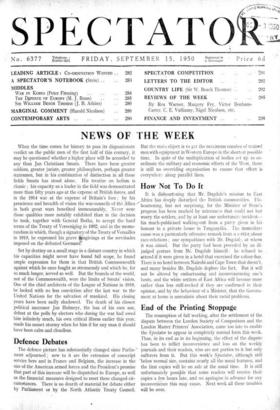NEWS OF THE WEEK When the time comes for history
to pass its dispassionate verdict on the public men of the first half of this century,, it may be questioned whether a higher place will be accorded to any than Jan Christiaan Smuts. There have been' greater soldiers, greater jurists, greater philosophers, perhaps greater statesmen, but in his combination of distinction in all those fields Smuts has stood alone. His treatise on holism is classic ; his capacity as a leader in the field was demonstrated in both great wars benefited immeasurably. Never were those qualities more notably exhibited than in the decision he took, together with General Botha, to accept the hard terms of the Treaty of Vereeniging in 1902, and in the memo- randum in which, though a signatory of the Treaty of Versailles in 1919, he expressed his grave isgivings at the servitudes imposed on the defeated German .
Set by destiny on a small stage in a distant country in which his capacities might never have found full scope, he found ample expression for them in that British Commonwealth against which he once fought so strenuously and which he, for so much longer, served so well. But the bounds of the world, not of the Commonwealth, were the limits of Smuts' vision. One of the chief architects of the League of Nations in 1919, he looked with no less conviction after the last war to the United Nations for the salvation of mankind. His closing years have been sadly shadowed. The death of his chosen political successor Jan Hofmeyr, the loss of his own son, defeat at the polls by electors who during the war, had owed him infinitely much, his own critical illness earlier this year, made his sunset stormy when for him if for any man it should have been calm and cloudless. in the 1914 'war at the expense of Britain's foes ; by his Africa has deeply disturbed the British communities. prescience and and breadth of vision the war-councils of the Allies/heartening, but not surprising, for the Minister of State's






















